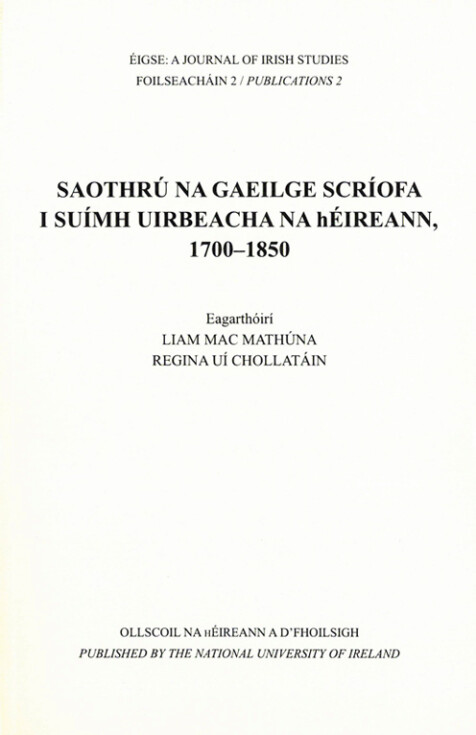Saothrú na Gaeilge Scríofa i Suímh Uirbeacha na hÉireann, 1700–1850
Cultivating written Irish in Ireland's urban areas, 1700–1850
Liam Mac Mathúna & Regina Uí Chollatáin, editors
This analysis of the cultivation of the Irish language in urban areas is the result of recent research by both editors and a conference on urban writing practices which was held in UCD Humanities Institute, 23–4 May 2013. The collection of essays raises questions regarding the links between urban life and the development of a modern Irish society. The evidence of emotion in early urban writings at the beginning of the 18thcentury queries the writing styles and practices which formed the thought processes of this and subsequent eras in writing and societal norms. The volume opens with a critique of the work of the Ó Neachtain scholarly circle in Dublin in the early 18th century, ranging over topics as varied as the evidence for contact with Swift to the influence of Rabelais (Cathal Ó Háinle, William J. Mahon, Vincent Morley and Lesa Ní Mhunghaile). Proinsias Ó Drisceoil draws on Pierre Bourdieu’s theoretical framework to evaluate Irish/English interaction in Callan, Co. Kilkenny, while Neil Buttimer and Fionntán de Brún analyse the impact of Irish in the public spheres of Cork and Belfast. Breandán Ó Madagáin and Nollaig Ó Muraíle trace the fortunes of Irish west of the Shannon, in Limerick, Galway and Sligo. Liam Mac Mathúna and Regina Uí Chollatáin, editors of the volume, contribute an introductory essay which situates the initial conference’s theme within Léann na Gaeilge, or Irish language studies, in general.
Ardaíonn ábhar na n-imeachtaí seo ceisteanna bunúsacha i dtaca leis an ngaol idir an saol uirbeach agus an nua-aoiseacht. An féidir a léiriú go háititheach go raibh an chéadfacht mhothúchánach á cur in iúl ar bhealaí nua? An rabhthas níos réidhe chun mothúcháin a chur i bhfocail agus i bhfriotail as Gaeilge i mBaile Átha Cliath ag tús an 18ú haois ná mar a bhíothas roimhe seo? Nó, an amhlaidh go raibh níos mó ná sin i gceist, is é sin, go raibh cruinneshamhail nua tagtha ar an bhfód? An raibh aon éifeacht aige seo go léir ar an Athbheochan ag casadh an fichiú haois, maidir le tuiscintí, coincheapa nó gníomhaíocht de? An bhfuil éifeacht intleachtúil aige sa lá atá inniu ann?
Dr Regina Uí Chollatáin is a Senior Lecturer and Head of the UCD School of Irish, Celtic Studies and Folklore. Her main research includes Irish Revival and Media history and criticism. She is the author of An Claidheamh Soluis agus Fáinne an Lae 1899–1932 (2004) and Iriseoirí Pinn na Gaeilge (2008). She has published widely; her most recent book is Litríocht na Gaeilge ar fud an Domhain (Nic Congáil et al., 2015). She was the recipient of the Senior Visiting Professorship from the Ireland Canada University Foundation (2011–12) and a member of the first State board of TG4 (2007–12). She is currently working on a monograph on the history of Irish language media in the context of the Revival movement and print culture.
Liam Mac Mathúna is Professor Emeritus of Irish at University College Dublin. His extensive publications on Irish language, literature and culture include Béarla sa Ghaeilge (2007), a study of Irish/English code-mixing in literature composed in Irish 1600–1900, and a new edition of An tAthair Peadar Ua Laoghaire’s ground-breaking novel, Séadna (2011). He is editor of Éigse: A Journal of Irish Studies, which is published by the National University of Ireland. He is currently engaged in a study of the Ó Neachtain circle of Irish-language scholars in Dublin, 1700–1750, and the diaries of Douglas Hyde, 1874–1912, as part of a wider project researching the impact of modernity on Irish-speaking communities.

